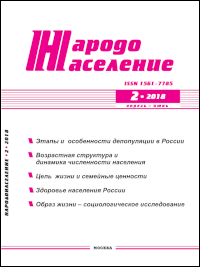Семья перед лицом новых социальных вызовов
Выражение признательности
РФФИпроект №17-06-00093
Для цитирования
Доброхлеб В. Г., Баллаева Е. А. Семья перед лицом новых социальных вызовов // Народонаселение. 2018. Том 21. № 2. С. 60-68.
Аннотация
В статье дан анализ состояния современной семьи в России. Начиная с 2000 гг., удалось зафиксировать множество разнонаправленных изменений семейных отношений, включая рост традиционализма, растущую модернизацию семьи как института и даже социальную деградацию внутрисемейных и межсемейных связей, которую квалифицируют как кризис. В свою очередь, кризисное состояние семьи является долгосрочным источником негативных явлений во всех сферах социальной жизнедеятельности. Рассогласование семейных ценностей приводит к дисбалансу гендерных ролей и снижает качество супружеских отношений. Социальные проблемы локализуются в системе социального взаимодействия, в его особенностях, которые определяют социальную ситуацию личности или семьи. Так, современной семье не хватает одного источника дохода, а потому семьи с двумя работающими родителями — норма современной российской действительности, связанная не с выбором женщины, а с объективной необходимостью. Происходящие в новой России трансформации с одной стороны отражаются на демографическом состоянии, с другой стороны — именно демографический фактор определяет возможности социально-экономического развития страны. Все более сложные социально-экономические вызовы повышают требования к процессу социализации новых поколений, и это, в том числе, делает семью необходимым институтом. В статье показано, что содержательная характеристика современных направлений государственной семейной политики должна быть существенно расширена, правовое регулирование основываться на едином методологическом и концептуальном подходе к современным семейным отношениям. Необходима единая стратегия государственной демографической, семейной и гендерной политики, направленная, прежде всего, на улучшение материального положения российской семьи и ее социального благополучия.
Ключевые слова:
семья, гендер, семейные отношения, гендерные отношения, демографическая политика, семейная политика, гендерная политика
Литература
Миронов Б. Н. Социальная история России периода империи (XVIII—начало XX в.): В 2 т.—3-е изд., испр., доп. — СПб.: 2003.
Социально-демографический портрет России по итогам Всероссийской переписи населения 2010 года. [Электронный ресурс]. — Режим доступа; http://www.gks.ru/free_doc/new_site/perepis2010/croc/Documents/portret-russia.pdf.
Женщина, мужчина, семья в России: последняя треть ХХ века. Проект «Таганрог». — М.: ИСЭПН, 2001.
Пресс-выпуск ВЦИОМ № 3597 «Равенство в семье: от деклараций — к реальности?» [Электронный ресурс]. — Режим доступа: https://wciom.ru/index.php?id=236&uid =116459
Шашков Н. И., Ерохина Л. Д., Шендерецка А. П. и др. Философия. Конспекты лекций / Под ред. А. А. Ильина. — Владивосток. 68 с. [Электронный ресурс]. — Режим досту-па: http://www.abc.vvsu.ru/books/filosof/default.asp (Дата обращения 01.07. 2016)
Куфтяк Е.В. Жизнеспособность семьи: теория и практика // Медицинская психоло-гия в России: электрон. науч. журн. — 2014. — № 5(28) [Электронный ресурс]. — Ре-жим доступа: http://mprj.ru
Доклад «Об основных итогах федерального статистического наблюдения «Социаль-но-демографическое обследование (микроперепись населения) 2015 года» [Элек-тронный ресурс]. — Режим доступа: http://www.gks.ru/free_doc/new_site/population/ demo/micro-perepis/finish/micro-perepis.html
Мониторинг общественного мнения, № 6 (136), ноябрь — декабрь 2016. Социальное самочувствие россиян: взлеты и падения 19-20 ноября 2016 г. [Электронный ресурс]. — Режим доступа: http://wciom.ru/books_magazines/knigi_avtorov_vciom_i_ rossijskih_uchenyh/ (Дата обращения 12.12. 2016).
Сысенко В. А. Семья сегодня: Сб. статей. — М., 1979.
Яницкий О.Н. Критические состояния среды жизни и способы адаптации к ним // Россия реформирующаяся. Ежегодник / Отв. ред. М.К. Горшков. — М.: Новый хроно-граф, 2016, — Вып. 14. — С. 55.
Доброхлеб В.Г., Баллаева Е.А. Соотношение демографической, семейной и гендер-ной политики // Народонаселение. — 2017. — № 4. — С. 44-55.
Социально-демографический портрет России по итогам Всероссийской переписи населения 2010 года. [Электронный ресурс]. — Режим доступа; http://www.gks.ru/free_doc/new_site/perepis2010/croc/Documents/portret-russia.pdf.
Женщина, мужчина, семья в России: последняя треть ХХ века. Проект «Таганрог». — М.: ИСЭПН, 2001.
Пресс-выпуск ВЦИОМ № 3597 «Равенство в семье: от деклараций — к реальности?» [Электронный ресурс]. — Режим доступа: https://wciom.ru/index.php?id=236&uid =116459
Шашков Н. И., Ерохина Л. Д., Шендерецка А. П. и др. Философия. Конспекты лекций / Под ред. А. А. Ильина. — Владивосток. 68 с. [Электронный ресурс]. — Режим досту-па: http://www.abc.vvsu.ru/books/filosof/default.asp (Дата обращения 01.07. 2016)
Куфтяк Е.В. Жизнеспособность семьи: теория и практика // Медицинская психоло-гия в России: электрон. науч. журн. — 2014. — № 5(28) [Электронный ресурс]. — Ре-жим доступа: http://mprj.ru
Доклад «Об основных итогах федерального статистического наблюдения «Социаль-но-демографическое обследование (микроперепись населения) 2015 года» [Элек-тронный ресурс]. — Режим доступа: http://www.gks.ru/free_doc/new_site/population/ demo/micro-perepis/finish/micro-perepis.html
Мониторинг общественного мнения, № 6 (136), ноябрь — декабрь 2016. Социальное самочувствие россиян: взлеты и падения 19-20 ноября 2016 г. [Электронный ресурс]. — Режим доступа: http://wciom.ru/books_magazines/knigi_avtorov_vciom_i_ rossijskih_uchenyh/ (Дата обращения 12.12. 2016).
Сысенко В. А. Семья сегодня: Сб. статей. — М., 1979.
Яницкий О.Н. Критические состояния среды жизни и способы адаптации к ним // Россия реформирующаяся. Ежегодник / Отв. ред. М.К. Горшков. — М.: Новый хроно-граф, 2016, — Вып. 14. — С. 55.
Доброхлеб В.Г., Баллаева Е.А. Соотношение демографической, семейной и гендер-ной политики // Народонаселение. — 2017. — № 4. — С. 44-55.
Форматы цитирования
Другие форматы цитирования:
APA
Доброхлеб, В. Г., & Баллаева, Е. А. (2018). Семья перед лицом новых социальных вызовов. Народонаселение, 21(2), 60-68. извлечено от https://jour.fnisc.ru/index.php/population/article/view/6514
Раздел
ЖЕНЩИНА, МУЖЧИНА, СЕМЬЯ








